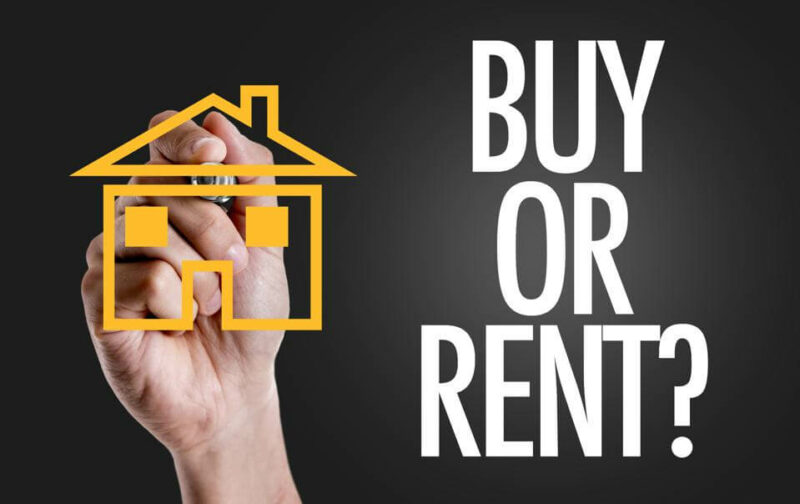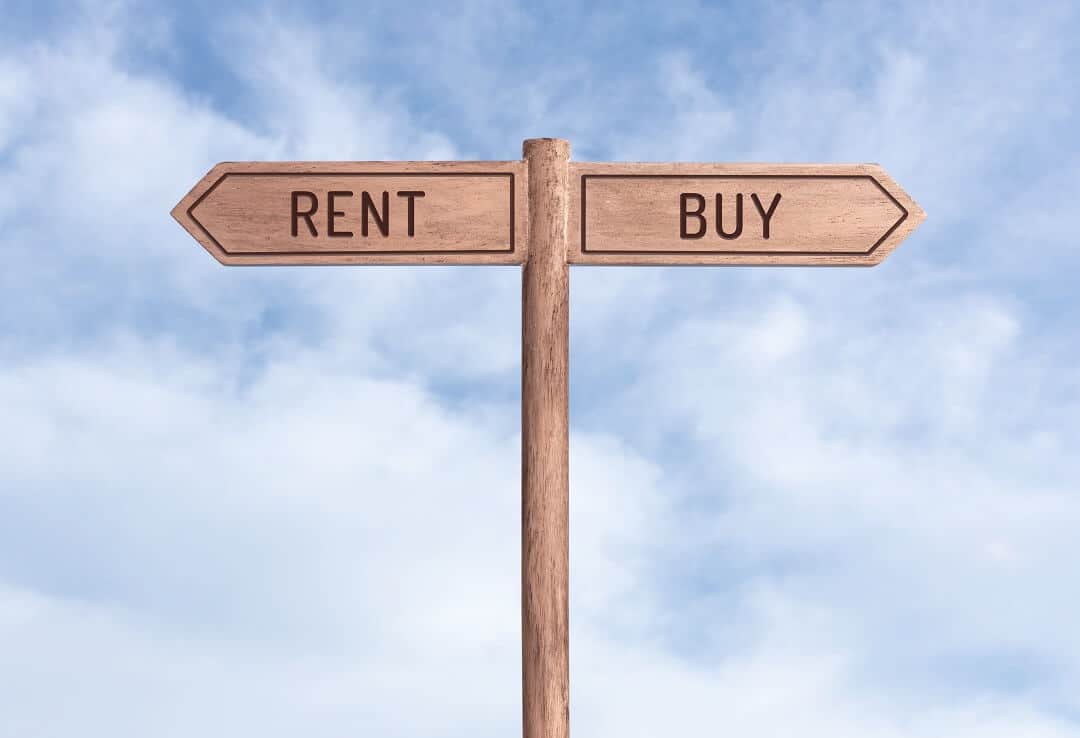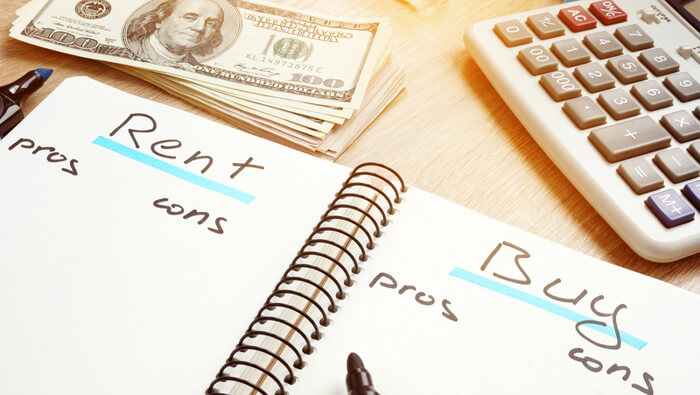It’s the age-old question — should I rent or buy a house? The reality is there is no right or wrong answer. Individual circumstances and economic conditions will play a factor. There are pros and cons to renting or buying, so carefully weighing your choices becomes a priority.
Here we will take a closer look at the common pros and cons associated with both renting and buying a residential property. Factors to consider will depend on specific individual circumstances. Understanding your specific lifestyle needs, your financial situation, both short-term and long-term, and your specific housing market.
This guide will help you answer that age-old question once and for all, helping you decide your best housing option.
Key takeaways
- Pros of renting: cheaper in some areas, flexible, fixed expenses.
- Cons of renting: rent not an investment, rent can increase, limited customization.
- Pros of owning: build equity, tax benefits, customize property.
- Cons of owning: long-term commitment, expensive maintenance, not ideal for frequent moves.
Understanding renting
Renting refers to the act of occupying a residential property owned by someone else in exchange for a monthly rental payment. It is a housing arrangement where individuals or families, known as tenants or renters, enter into a rental agreement or lease with a landlord or property owner. Renting a home allows individuals to temporarily reside in a dwelling without the long-term commitment and financial responsibility associated with homeownership.
Renters typically pay a fixed amount of rent each month and may be responsible for additional expenses such as utilities or maintenance fees as stipulated in the lease agreement. The rental agreement terms usually specify the duration of the tenancy, the rights and responsibilities of both parties, and any restrictions or rules governing the use of the property. Renting a home allows individuals to choose a suitable living space, adapt to changing needs or circumstances, and avoid the costs and obligations associated with owning a property.
Here we explore the pros and cons of renting and what it may mean for you.

Pros of renting a house
There are some circumstances where it just makes sense to rent a home versus buying one. Those who live in high-cost areas or have careers that force them to relocate frequently are some of those who may benefit from renting. Let’s take a closer look at the pros and cons of renting a house.
1. Cheaper in some areas
In some areas, especially in certain major cities, the question of renting vs buying comes down to the cost of the location. For many major cities, renting is the cheaper option. Cities that top the list as some of the most expensive cities to live in are located in the western half of the country. Chicago, Portland, and L.A., with the largest gap in the country seen in San Francisco, are all places where it is cheaper to rent than it is to buy. According to Forbes, a buyer would have to spend 79.68% of the median income on housing payments, while a renter would spend only 35.66%.
2. Cheaper in certain situations
When purchasing a home, an important consideration is that an owner will not see an ROI for approximately five years after purchase. If you plan on moving within a few years, you could lose money simply by paying down mortgage interest without gaining equity in the home. This would be in addition to added expenses such as property tax, purchasing fees, and home repairs. If moving too soon, these expenses would be a dead loss to the buyer.
3. Flexibility
One of the most significant benefits of rental is the flexibility it offers. Those who frequently move for work or their lifestyle may not want to be bogged down with the extra expenses and difficulty of homeownership when going from place to place, especially if they won’t have time to build equity (remember the 5-year rule).
4. Fixed expenses with no surprise fees
Unlike owning a home, the maintenance of a rental is not the renter’s responsibility. Home upkeep can be a prohibitive expense and is a minefield of surprise repairs and structural emergencies. Monthly budgeting is simpler and more consistent when not having to factor in maintenance fees or extra taxes.
5. Lower initial costs
One of the significant advantages of renting is lower initial costs. Compared to purchasing a home, renting typically requires a smaller upfront financial commitment. Renters are usually required to pay a security deposit, which is typically a fraction of the property’s value, rather than a large down payment required for a home purchase.
6. No property taxes
Property taxes are typically the property owner’s responsibility, meaning renters are not directly burdened with this cost. Property taxes are imposed by local governments and are based on the property’s assessed value. By renting, individuals can avoid the financial obligation of paying property taxes, which can be a significant expense for homeowners. This allows renters to have more predictable and stable monthly housing costs since property taxes can fluctuate over time due to changes in property values or local tax rates.
Cons of renting a house
Every pro list needs a con lineup to compare it to, so that’s just what we did for you. Let’s take a look at a few cons to renting a house.
1. Rent is an expense
Rent is a pure expense, not an investment. When paying a mortgage, you pay into the property, which gradually builds equity. Equity is the amount that is owned free and clear and will increase over 15 to 30 years until the home is owned outright. Rent pays for the privilege of living in a house on a monthly basis, and nothing more.
2. Rent can increase
While a rental price may look good at the onset, remember that rent can increase at the whim of the property owner. A mortgage remains steady, with the added benefit of improving your credit score if paid promptly.
3. No tax benefits
Renting a house does not offer tax benefits. Interest on a mortgage can be claimed as an expense in the yearly tax file, reducing your overall tax bill.
4. Cannot customize property
An important consideration when deciding between home rental and ownership is the ability to customize. A renter is not free to change any aspect of the property without express permission from the property owner. This includes the choice of paint color, plantings, or any structural changes. For those who want their home to reflect their own stylistic choices, homeownership may be a better choice.
5. No equity or investment value
One of the disadvantages of renting is the lack of equity or investment value. Unlike homeownership, where individuals build equity in their property over time, renting does not offer the opportunity to accumulate value or ownership stake in the property. Rent payments are essentially payments for the right to occupy the property without any long-term financial benefits. Renters do not have the opportunity to build equity through mortgage payments or property appreciation. This means that the money spent on rent does not contribute to personal wealth or serve as an investment.

Exploring homeownership
Homeownership refers to the state of owning a residential property, typically a house or a condominium, along with the land on which it is situated. It is a form of real estate ownership that provides individuals or families with several key features, such as stability and the ability to build equity. However, homeownership can have downsides, such as increased financial burdens and responsibilities. Here we explore the pros and cons of homeownership and what it may mean for you.
Pros of buying
In some circumstances, buying a home just makes better sense. For example, if you have a young family and are looking to keep your children in the same school district until they graduate, then buying a home and creating that stability may be important. Here we take a closer look at the pros of buying your home.
1. Long-term investment and equity building
Buying a home is often viewed as a long-term investment. Over time, properties have the potential to appreciate in value, allowing homeowners to build wealth and potentially gain a profitable return on their investment when selling.
Homeownership allows individuals to build equity over time as they make mortgage payments and the property appreciates in value. This equity can be tapped into for future financial needs or as a source of wealth.
2. Sense of stability
Owning a home provides stability, as homeowners have control over their living environment and are not subject to the uncertainties of rental agreements or the risk of eviction. It offers a sense of security and belonging within a community.
In addition, with a fixed-rate mortgage, homeowners can enjoy stable housing costs as their mortgage payments remain consistent over the life of the loan. This predictability can provide financial peace of mind compared to the possibility of rising rental prices.
3. Pride of ownership and leaving a legacy
Homeowners have the freedom to personalize and customize their property, creating a sense of pride and satisfaction. They can make improvements and modifications to suit their preferences and lifestyle.
In addition, owning a home allows individuals to leave a lasting legacy for their loved ones. It can be passed down through generations, providing a sense of stability and financial security for future family members.
4. Tax benefits
Homeownership may bring potential tax advantages, such as deducting mortgage interest and property tax payments, which can reduce taxable income and result in tax savings.
5. Potential rental income
Homeownership can offer the opportunity to generate rental income by renting out a portion of the property, such as a basement or an additional unit, providing an additional revenue stream.
Cons of buying
While there are numerous advantages to homeownership, it is important to consider the potential drawbacks as well. Here are some cons associated with buying a home.
1. Higher upfront costs
Purchasing a home typically requires a significant amount of upfront costs, including a down payment, closing costs, and other fees. This can be a substantial financial burden for some individuals, especially first-time homebuyers.
2. Long-term financial commitment
Buying a home involves a long-term financial commitment through mortgage payments, property taxes, insurance, and maintenance costs. This can impact monthly cash flow and limit flexibility in budgeting and financial decisions.
3. Home maintenance responsibilities
As a homeowner, you are responsible for the upkeep, maintenance, and repairs of your property. This includes routine maintenance tasks and the financial burden of unexpected repairs, which can be costly and time-consuming.
4. Property taxes and other regular expenses
Property taxes can increase over time, impacting monthly housing costs. Homeowners are also responsible for other ongoing expenses such as homeowners association fees, utilities, and insurance, which can further add to the overall cost of homeownership.
5. Less flexibility and mobility
Homeownership ties individuals to a specific location, making it more challenging to move or relocate quickly. Selling a home can take time and may incur costs, such as real estate agent fees and closing costs, which can hinder mobility and flexibility in career or lifestyle choices.
6. Potential loss of value
Real estate markets are subject to fluctuations, and there is no guarantee that the value of a home will appreciate. Economic downturns or local market conditions can result in a decline in property value, potentially leading to a loss if the home needs to be sold.

Considerations when making the decision
When deciding between buying or renting a home, several key considerations should be taken into account.
Financial readiness
Assessing your financial situation is crucial. Consider factors such as your credit score, savings for a down payment, and ability to handle mortgage payments, property taxes, insurance, and maintenance costs. Compare the costs of renting versus buying in your desired location to determine what is financially feasible and sustainable for you.
Lifestyle and future plans
Consider your lifestyle preferences and future plans. Are you looking for flexibility and the ability to move frequently? Renting might be a better option. If you desire stability, a sense of ownership, and the ability to customize your living space, homeownership could be more suitable.
Local real estate market
Research the local real estate market to understand its current conditions and trends. Evaluate whether it is a buyer’s or seller’s market, the availability of affordable homes, and the potential for property value appreciation. This information can help inform your decision and determine if it aligns with your financial goals.
Maintenance and responsibilities
Assess your willingness and ability to handle maintenance and repair responsibilities associated with homeownership. Owning a home requires time, effort, and potentially significant costs for upkeep. If you prefer a hands-off approach or lack the resources for maintenance, renting may be more suitable.
Determining your best housing option
Owning a home is both a commitment and an investment. It’s difficult to give a quick answer to the complex question of, “Should I buy a house or rent?” A better choice is to analyze the major factors of homeownership and ultimately decide if renting or buying a house is best for your personal income and lifestyle.
The need for mobility in a chosen career
An important element to factor into the rent versus buy equation is your career path. Is it likely that you’ll be staying in one area for a long time? Is your company based in one city, or is it a possibility that you might be moved to another office? Is employment steady in your field? If there are many questions surrounding your ability to stay rooted in one place for a period of time, a rental might be a better option. You need time to build equity and allow for a move, which is not always a quick and easy process.
A personal need to settle down or to be able to move freely
In that same vein, those who are not ready to settle into a specific place for long may not be the best candidate for homeownership. If moving about freely is a must, rental is a more practical solution. A mobile lifestyle is not the best match for homeownership, which requires stability. Remember that there is no ROI on owning a home for approximately five years after purchase, so frequent moves are not financially savvy with a home purchase.
Long-term economic development in the area
Before committing to homeownership, be sure to take a look at long-term trends in economic development for your area. Whether your home will appreciate or depreciate in value depends directly on the property it sits. Careful research is necessary to avoid financial mishaps. If you are unsure of a particular area, renting is the safest option.
Helping you find your new home
Owning a home is considered the ultimate American dream, but sometimes it just makes sense to wait and continue renting. If you have been renting and you’re ready to stop paying someone else’s mortgage, reach out to a Hero Home Programs™ representative. Their experienced home-buying experts will help you find the perfect realtor and lender for your needs. They can also help you find grants in your area and special housing partners. Their goal is to save you as much money as possible while helping you achieve your dream of homeownership.












